Because poetry is perfect for busy teens. It’s compact and fast to read, fun to share, great to perform, and full of powerful emotions and memorable moments. Reading poetry can lead to writing poetry and offers teens an outlet for expressing themselves. Poetry is not “leveled” or tied to age, grade, or reading skills, so it’s a wonderful equalizer for teens with differing reading abilities who might be learning English as a new language too. It’s image-rich with vivid vocabulary. It’s available in anthologies, picture books, and verse novels—something for everyone. Where do you start in finding poetry to share with young adults?
One place where we can find the work of a lot of different poets is in the classic form of the poetry anthology. Here, one or two editors gather many poems by many writers and organize them into a variety of themes or topics. It’s a great way to browse and pick and choose and skim. Readers can revisit classic (“dead”) poets and discover new voices too. Here are ten of our favorites for teens.
1. Carlson, Lori M. Ed. 2005. Red Hot Salsa: Bilingual Poems on Being Young and Latino in the United States. Henry Holt. *Featuring many award-winning and contemporary Latino and Latina poets, plus teens themselves
2. Greenberg, Jan. Ed. 2001. Heart to Heart: New Poems Inspired by Twentieth-Century American Art. Abrams.*Ekphrastic poetry with each poet writing in response to a work of art
3. Heard, Georgia. Ed. 2006 (reissued). This Place I Know: Poems of Comfort. Candlewick.*Poets write about loss, fear, and grief
4. Hopkins, Lee Bennett. Ed. 2013. All the World’s a Stage. Creative Editions.*Poems on life’s different stages, from “entrances” to “exits,” with childhood, love, war, and more in between
5. Janeczko, Paul B. Ed. 2004. Blushing: Expressions of Love. Scholastic.*Both classic and contemporary poems about new love, unrequited love, lost love, love remembered
6. Lewis, J. Patrick. Ed. 2015. National Geographic Book of Nature Poetry. National Geographic.*Vivid photographs provide a stunning background for poems about the natural world
7. Nye, Naomi Shihab. Ed. 1992. This Same Sky: A Collection of Poems from Around the World. Four Winds Press.*A collection of poems in English by writers from all around the world
8. Paschen, Elise and Raccah, Dominique. Eds. 2010. Poetry Speaks: Who I Am. Sourcebooks. *Candid poems about identity, ideas, and connections in a very accessible format
9. Rampersad, Arnold and Blount, Marcellus. Eds. 2013. Poetry for Young People: African American Poetry (reissued, reillustrated). Sterling. *Stylized illustrations accompany these powerful poems by 27 African American poets from Phillis Wheatley to contemporary poets
10. Vardell, Sylvia and Wong, Janet. Eds. 2013. The Poetry Friday Anthology for Middle Schoolhttps://www.amazon.com/Poetry-Friday-Anthology-Middle-School/dp/193705778X/ref=sr_1_1?s=books&ie=UTF8&qid=1476453614&sr=1-1&keywords=the+poetry+friday+anthology+for+middle+school+common. Princeton, NJ: Pomelo Books.*110 poems by 71 poets about new schools, coping with family, and being a friend along with Take 5! mini-lessons for every poem
Teens also enjoy discovering poetry written by their fellow teens and published in mainstream books (as well as online, in magazines, in zines, etc.). They can see the power in getting published and may be encouraged to submit their own writing for publication. Here are several notable collections of poetry written by young people.
1. Aguado, Bill. Ed. 2003. Paint Me Like I Am. Harper.*Raw and honest poems explore identity, creativity, and relationships
2, Franco, Betsy. 2001. Ed. Things I Have to Tell You: Poems and Writing by Teenage Girls. Candlewick.*Teen girls offer prose and poems about sexuality, identity, fears, dreams, and angst
3. Franco, Betsy. 2001. Ed. You Hear Me? Poems and Writing by Teenage Boys. Candlewick.*Prose and poetry by teen boys explore angry and honest emotions and experiences
4. Franco, Betsy. 2008. Ed. Falling Hard: 100 Love Poems by Teenagers. Candlewick.*Honest poems about love by teens from many different backgrounds and sexual orientations
5. Johnson, Dave. Ed. 2000. Movin’: Teen Poets Take Voice. Orchard.*Teens write about real life in poetic and evocative language
6. Lyne, Sandford. Ed. 2004. Soft Hay Will Catch You. Simon & Schuster.*Kentucky poet Lyne gathers teen poems about the search for self, home and family, and connections to place
7. McLaughlin, Timothy. Ed. 2012. Walking on Earth and Touching the Sky: Poetry and Prose by Lakota Youth at Red Cloud Indian School. Abrams.*Powerful prose and poetry by Lakota students at Red Cloud Indian School in South Dakota
8. Nye, Naomi Shihab. Ed. 2000. Salting the Ocean: 100 Poems by Young Poets. Greenwillow.*Nye collected “100 poems by 100 poets in grades one through twelve”
9. Tom, Karen, and Kiki. 2001. Angst! Teen Verses from the Edge. Workman.*Girls share edgy thoughts and frustrations
10. WritersCorps. 2008. Tell the World. HarperCollins.*A cross-section of teen voices sharing slices of teenage life
And for teens who want to experiment with writing poetry, there are several helpful resource books that can jumpstart the process or guide them toward publication. Several poets have written books for young people ABOUT poetry writing. Here are resources that they may find helpful.
1. Appelt, Kathi. 2002. Poems from Homeroom: A Writer’s Place to Start. Henry Holt.*Appelt combines her original poems with ideas and creative writing exercise
2. Fletcher, Ralph J. 2001. A Writer’s Notebook: Unlocking the Writer Within You. HarperTrophy. Advice on how to keep notes and then turn them into stories and poems
3. Fletcher, Ralph J. 2002. A Writer’s Notebook: Unlocking the Writer Within You HarperCollins.*A practical guide to creating poetry, complete with interviews with poets
4. Holbrook, Sara and Salinger, Michael. 2006. Outspoken! How to Improve Writing and Speaking Skills through Poetry Performance. Heinemann.*A fun and conversational guide
5. Janeczko, Paul B., comp. 2002. Seeing the Blue Between: Advice and Inspiration for Young Poets. Candlewick.*A poetry collection with poems and advice from 32 poets
6. Kapell, Dave and Steenland, Sally. 1998. Kids’ Magnetic Poetry Book and Creativity Kit. Workman.*Tips and tools for making poetry creation fun and game-like
7. Lawson, JonArno. 2008. Inside Out: Children's Poets Discuss Their Work. Walker. *23 poets share poems and then explain how the poem came to be
8. Prelutsky, Jack. 2008. Pizza, Pigs, and Poetry: How to Write a Poem. Greenwillow. The poet shares how he creates poems from anecdotes, often using comic exaggeration
9. Salas, Laura Purdie. 2011. Picture Yourself Writing Poetry: Using Photos to Inspire Writing. Capstone.*A clear and engaging approach with writing prompts and mentor texts
10. Wolf, Allan. 2006. Immersed in Verse: An Informative, Slightly Irreverent & Totally Tremendous Guide to Living the Poet’s Life. Sterling.*A witty guide for “going gonzo over words”
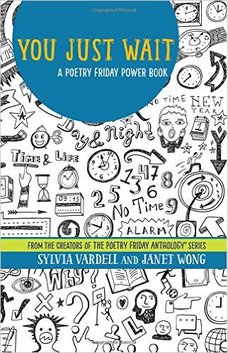
Janet Wong and I have recently published a book that does a bit of all three of these things: anthologizes poems by various poets, encourages teens to try writing poetry, and offers guidance on the poetry writing process. Our latest book is called You Just Wait: A Poetry Friday Power Book. It’s a mashup of:
- Poems from an anthology
- Plus new poems written in response to those poems
- Plus creative activity pages to jumpstart thinking, brainstorming, responding, and writing
For the educator, the structure of the book provides a five-part model for instruction with each of the following components ideal for guiding the reading, responding, and writing process:
*PowerPlay Activity
*Outside Poem
*Response Poem
*Mentor Text Poem
*Power2You Writing Prompt
There are a dozen sets of “PowerPack” linked activities, each with a slightly different focus, encouraging readers to consider the elements of repetition, rhyme (including internal rhyme), structure, dialogue, and form (list poems, prose poems, sequence poems, cinquains, poems of address, concrete/shape poems, acrostic poems, found poems, and odes). Here’s a graphic showing the five components in each PowerPack at a glance.
Citation: http://www.whitehouse.gov/the-press-office/2011/05/11/remarks-first-lady-poetry-student-workshop
Janet S. Wong is a graduate of Yale Law School and a former lawyer who became a children’s poet. Her work has been featured on The Oprah Winfrey Show and other shows. She is the author of 30 books for children and teens on chess, creative recycling, yoga, superstitions, driving, and more.
Together, Vardell and Wong are the creative forces behind The Poetry Friday Anthology series.
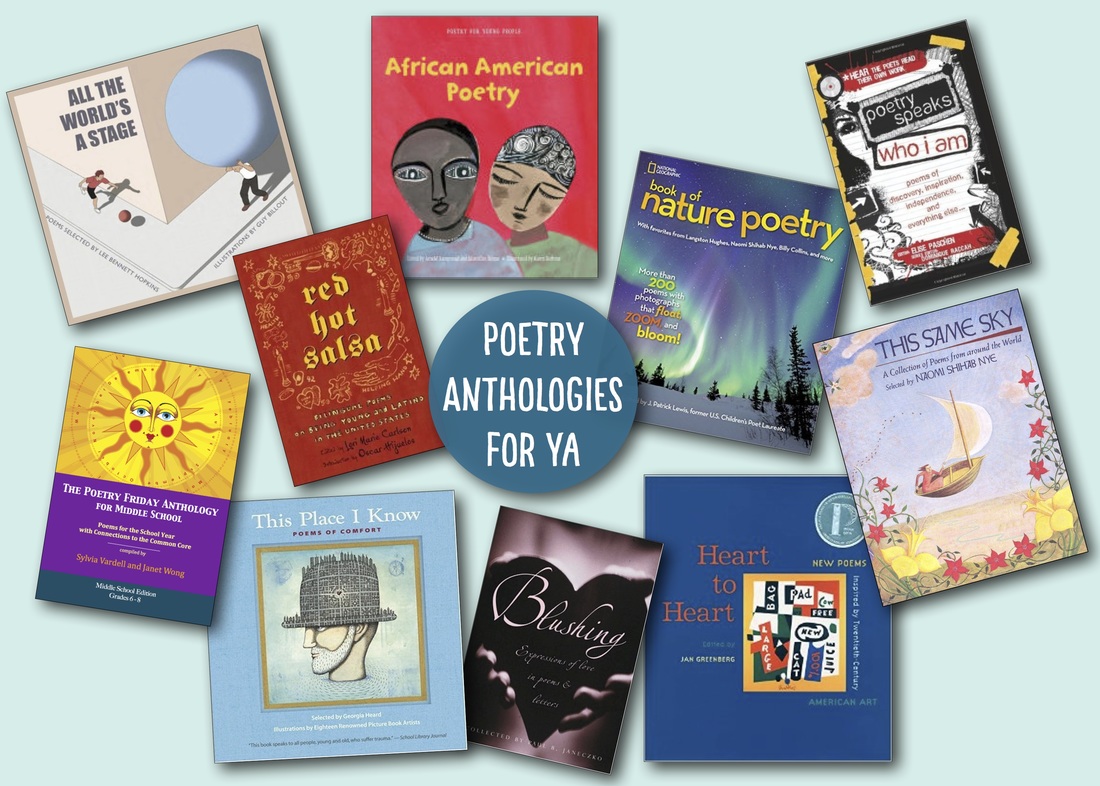
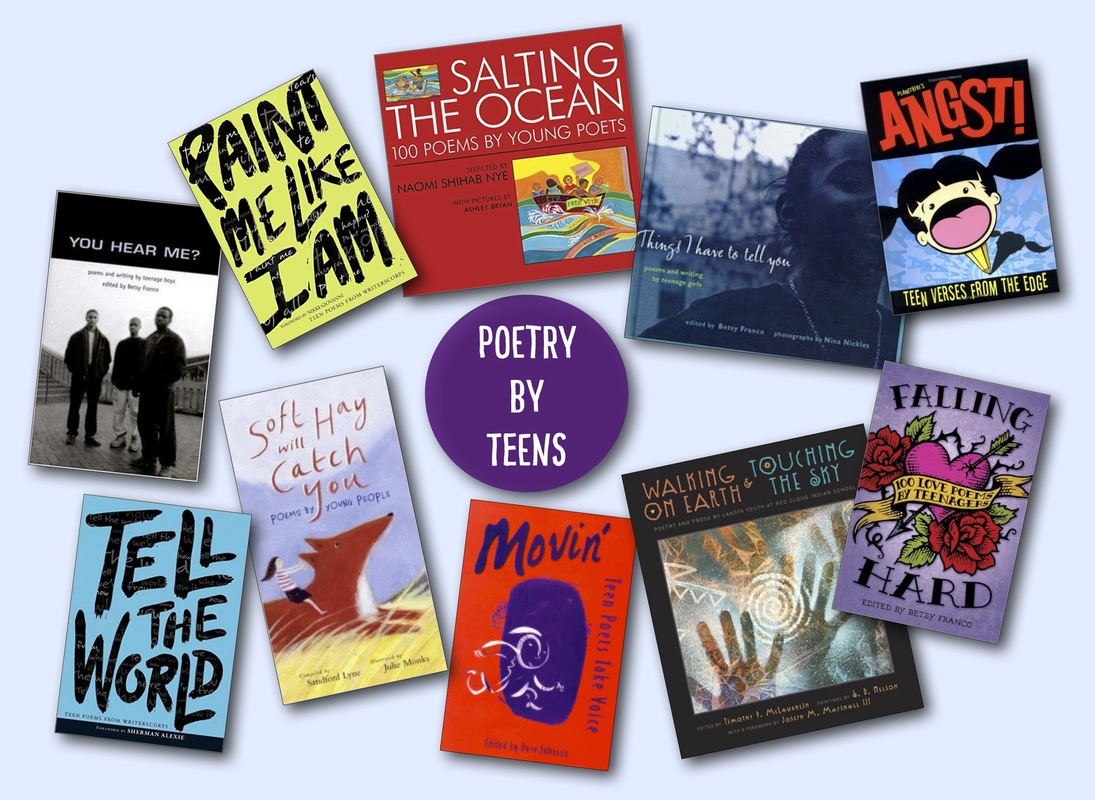
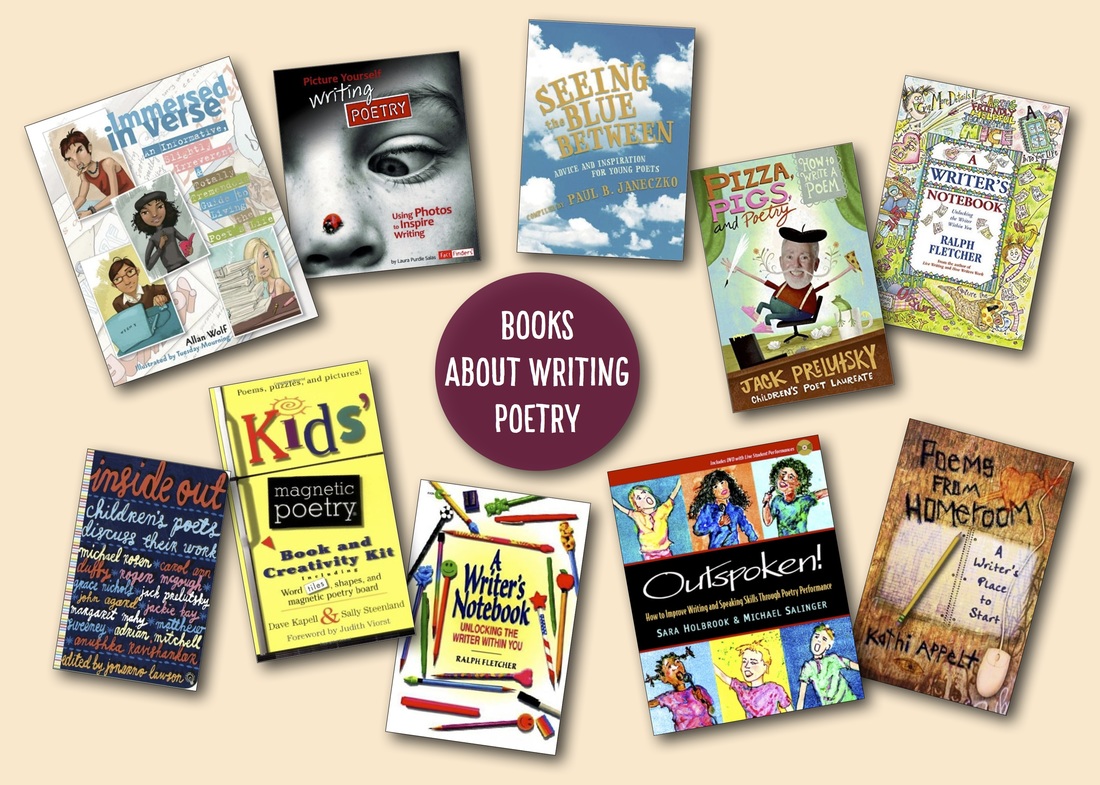
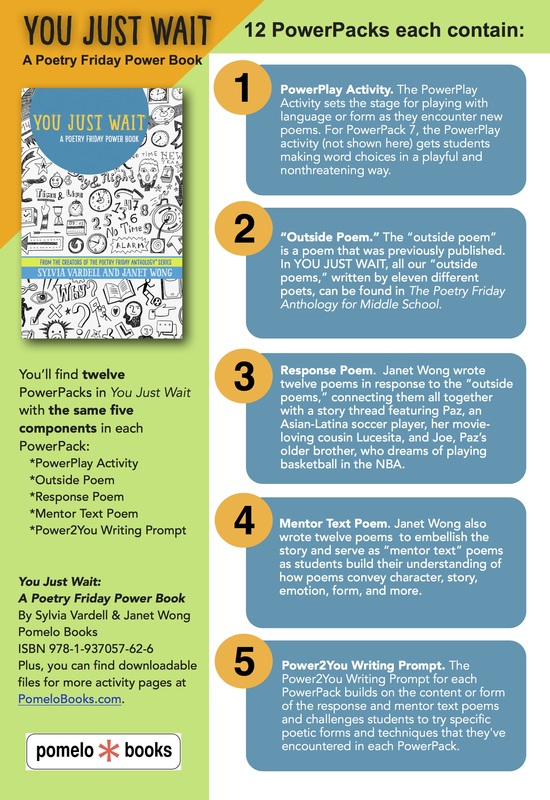
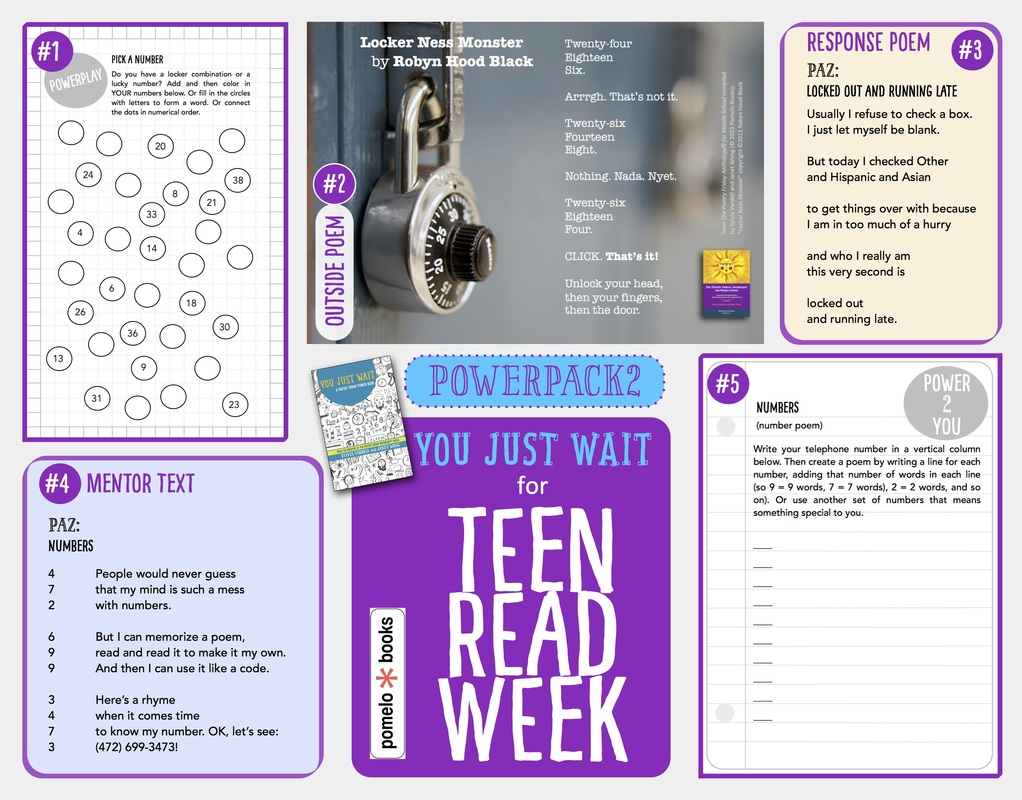

 RSS Feed
RSS Feed